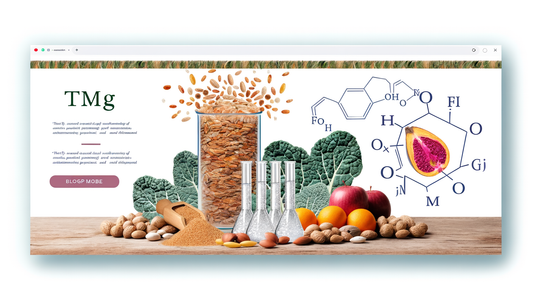TMG Betaine, also known as trimethylglycine or simply betaine, is a naturally occurring compound found in various foods like beets, spinach, and whole grains. It has gained attention in recent years for its potential health benefits, including its possible role in anti-aging processes.
Here are 10 reasons it's a great addition to your longevity routine.
- Methylation and Epigenetics: TMG's role as a methyl donor is crucial in epigenetic processes. As we age, our DNA methylation patterns tend to change, which can affect gene expression and cellular function. By supporting proper methylation, TMG may help maintain healthier epigenetic patterns, potentially slowing down some aspects of cellular aging.
- Homocysteine and Cardiovascular Health: High homocysteine levels are associated with increased risk of cardiovascular disease, particularly in older adults. TMG's ability to lower homocysteine could be significant for healthy aging. Some studies have shown that TMG supplementation can reduce homocysteine levels by up to 20-30% in some individuals.
- Liver Function and Detoxification: As we age, our liver's ability to process toxins and metabolize fats can decline. TMG's support of liver function could be particularly beneficial for older adults. It may help prevent or reduce non-alcoholic fatty liver disease (NAFLD), which becomes more common with age.
- Cellular Hydration and Protein Stability: TMG's role as an osmolyte goes beyond simple hydration. It helps stabilize proteins within cells, which is crucial for maintaining cellular function as we age. This protein-stabilizing effect may help cells better withstand various stressors associated with aging.
- Mitochondrial Function: Some research suggests that TMG may support mitochondrial function. Mitochondria, the powerhouses of our cells, tend to become less efficient with age. By potentially improving mitochondrial efficiency, TMG could help maintain energy production and cellular health in aging tissues.
- Inflammation and Oxidative Stress: Chronic low-grade inflammation and oxidative stress are hallmarks of aging. While more research is needed, some studies indicate that TMG may have anti-inflammatory and antioxidant properties. This could potentially help mitigate some of the cellular damage associated with aging.
- Cognitive Function: Age-related cognitive decline is a significant concern for many. Some studies have shown that TMG supplementation may improve memory and cognitive function, particularly in older adults. This could be due to its roles in methylation, homocysteine reduction, and potential neuroprotective effects.
- Muscle Mass and Strength: Maintaining muscle mass and strength is crucial for healthy aging. Some research suggests that TMG may support muscle protein synthesis and could potentially help preserve muscle mass in older adults, especially when combined with resistance exercise.
- Bone Health: Osteoporosis is a common concern in aging populations. While more research is needed, some studies suggest that TMG may support bone health by influencing bone metabolism and potentially reducing the risk of osteoporosis.
- Synergy with Other Nutrients: TMG works synergistically with other nutrients involved in the methionine cycle, such as folate, vitamin B12, and vitamin B6. Ensuring adequate intake of these nutrients along with TMG may enhance its potential anti-aging benefits.
Additionally, individual responses to TMG supplementation can vary based on factors like genetics, diet, and overall health status. Some people may experience more pronounced benefits than others.
As with any supplement or anti-aging strategy, it's crucial to approach TMG as part of a holistic health plan that includes a balanced diet, regular exercise, stress management, and good sleep habits.
Always consult with a healthcare professional before starting any new supplement regimen, especially if you have pre-existing health conditions or are taking medications.






